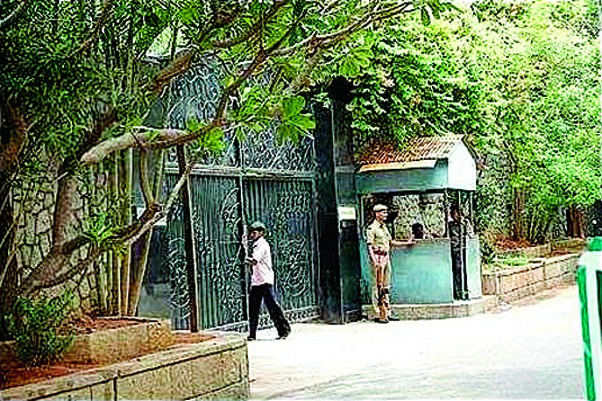
New Delhi, Feb. 14: Jayalalithaa's 36 Poes Garden residence was the hub of a conspiracy to launder her "ill-gotten wealth" and this was why V.K. Sasikala and two of her relatives lived at the address although they had no "blood relation" with the late chief minister, the Supreme Court said today.
"The flow of money from one account to the other proves that there existed active conspiracy to launder the ill-gotten wealth of Jayalalithaa for purchasing properties in the names of the firms," a bench of Justices P.C. Ghose and Amitava Roy said.
Sasikala's nephew V.N. Sudhakaran and her elder brother's widow Ilavarasi lived at Poes Garden during the period between 1991 and 1996, which the case covered. Sudhakaran was adopted by Jayalalithaa as her foster son and was later disowned and turned out of the house. Sasikala and Ilavarasi, whose husband was electrocuted on Jayalalithaa's farmhouse, continue to live at Poes Garden.
"All the accused congregated in the house of Jayalalithaa neither for social living nor Jayalalithaa allowed them free accommodation out of humanitarian concern, rather the facts and circumstances proved in evidence undoubtedly point out that Sasikala and her two relatives were accommodated in the house of Jayalalithaa pursuant to the criminal conspiracy hatched by them to hold the assets of Jayalalithaa," it noted.
The apex court also said that the conspiracy could not be proved by direct evidence and had to be inferred from the proven circumstances. "...In the case of conspiracy, each member thereof becomes the agent of the other and in law is bound by their actions inter se," it said. So far as Jayalalithaa and Sasikala are concerned, "one is the agent for other as partners of two firms and additionally Sasikala is the attorney of Jayalalithaa and is a co-conspirator, as imputed".
It noted that a "blanket instruction" was issued by Jayalalithaa that the directions made by Sasikala from time to time "ought to be followed and consequently the latter was to decide in which account the huge cash deposits were to be made".
Bank account jump
Fifty bank accounts of Jayalalithaa and Sasikala had mushroomed between 1991 and 1995, the Supreme Court noted, adding this was for transfer of their huge unaccounted wealth. The bench said the trial court had recorded that at the commencement of the check period, there were "hardly 10 to 12 bank accounts standing in the names of Jayalalithaa and Sasikala, but thereafter 50 accounts mushroomed during the check period".
"The maze of financial exchanges in fragments involving different combinations hint at the attempt to inflate individual and collective income of the respondents. The banking transactions... do not appear to be real," the bench said.
The 50 accounts were opened in the names of the accused persons and companies.
"According to the trial court, the overall evidence as considered by it disclosed that the business activities in the names of Sasikala and her two relatives started only during the check period and that they did not invest any funds on their own for that purpose and in fact utilised these as a front to enable Jayalalithaa and Sasikala transfer huge unaccounted money through the bank accounts thereof," the court said.
Gifts not 'lawful'
Cash and gifts worth Rs 2.15 crore received by Jayalalithaa on her birthday cannot be considered lawful income, the Supreme Court said. It concurred with the trial court's rejection of Jayalalithaa's plea that an amount of Rs 2.15 crore and foreign remittance worth Rs 77.52 lakh were received by her as birthday gifts in 1992 and should be considered lawful income. These gifts were in the form of jewellery, cash, demand drafts, silverware, silk sarees and framed portraits.
"Gifts to Jayalalithaa, a public servant, ...are visibly illegal and forbidden by law," the court said.
It did not agree with the findings of Karnataka High Court which had quantified the amount of gifts to be Rs 1.5 crore, principally referring to the income tax returns and the orders of the tax authorities. "To reiterate, disclosure of such gifts in the income tax returns of A1 (Jayalalithaa) and the orders of the income tax authorities on the basis thereof, do not validate the receipts to elevate the same to lawful income," the court said.
Petitioner Swamy
Subramanian Swamy, who has tormented several VIPs, had filed the original case on June 14, 1996. He said today: "This is a huge encouragement for me from the highest court of the land. This judgement shows that it does not matter which party does corruption, the courts will take a tough stand against them."
When the trial was on, Jayalalithaa returned to power in 2001 and many witnesses turned hostile. DMK general secretary K. Anbazhagan asked the Supreme Court to transfer the case outside Tamil Nadu to ensure a free and fair trial and it was sent to Karnataka. Even in Karnataka, there were charges that the then BJP government in the state had tried in vain to persuade the prosecutor to go slow since the party was then considered close to the AIADMK.
PTI AND OUR BUREAU











